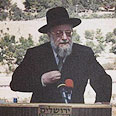
Rabbi Lau
Every few years, a perennial debate is reignited: What do we need a president for? Is it not an archaic, outmoded institution with no real power that steals a lot of money from all of our pockets?
That would be true, if we were trying to create some symbolic job for a washed-up politician, hoping his official position would shut him up or reign in his personal ambitions.
Opinion
Ronny A. Brizon
Rabbi Lau is the polar opposite of the Israel envisioned by the Zionist forefathers. We need an enlightened 'new Jew' to lead the country
On the other hand, a wise, original choice – some one of outstanding brilliance, a choice that makes us all say, "how did we not think of it until now? – could absolutely justify the existence of the lethargic institution. Rabbi Lau is just such a nomination.
Despite shortcomings
In an article last week opposing such a nomination, Moni Mordechai raises questions about the performance of Yisrael Meir Lau in general, and about his role as chief rabbi in particular.
And it's true – it would be better if Rabbi Lau had stood by the sides of those prevented by Jewish law from getting married, supported women whose husbands refuse to grant them Jewish divorces, waved the flag for civil marriage in Israel or represented the reformists trends in the Torah world.
Unfortunately, he did none of these things. It is also possible that the rabbi took payment for conducting wedding ceremonies and honed his media image instead of his spiritual influence. These things will certainly help him on his way to the presidency.
Special qualifications
But his predecessors – the ones who succeeded and the ones that failed - did the same. Almost all ran after the media, sought out praise and honor, and took care – at least in the period leading up to the nomination – to avoid statements that would arouse controversy. But Lau brings a bonus to the job that the others didn't have.
A year after the Gaza disengagement, as we lead up to realignment, with the Tal Law and Torah education once again in our sights, with preparations for the World Pride parade in full swing in the holy city and more haredi bodies undergoing autopsies at Abu Kabir, there is a growing community of Israelis that feels itself disengaged and pushed away.
Far from the Knesset and the government, where the parliamentary makeup is opposed to their world view, far from the police and the army who they view as illegal emissaries of a government that expels Jews from their homes, far from the Supreme Court that is considered a leftist, elitist mafia, concerned with the supremacy of human rights but unconcerned with the Jewish makeup of this country.
Let me say unequivocally: I do not share these empty views in any way, shape or form. But in light of this growing "haredization," what's an independent country to do?
Nor giving up
On one hand, it must enforce the law with no compromises, and use all its resources to reduce discrimination – be it with regard to a reasonable arrangement for enlisting yeshiva students to national service or child welfare benefits, responding to violent demonstrations on the streets of Jerusalem or Abu Kabir with an iron fist or taking them by surprise, as was done to the suspects of last year's lynch in Shfaram.
Violence is violence is violence, and the law is the law is the law. But do the actions of a wise country end there? A country trying despite it all to live together a little bit?
Alongside enforcement, there are other ways to signal that divorced population that the country, for its part, refuses to give up on them. The election of the former chief rabbi – even though he's become a star to the enemy "media," he still speaks words of Torah – could certainly be such a signal.
No real power
As a figurehead with no real authority, the rabbi will have no power to be involved in "secular-Orthodox" issues or to influence ever-growing religious coercion. But he will certainly serve as final proof as to the standing of rabbis in secular, Western Israel that refuses to abandon its Jewish inheritance. And how much more power would presidential calls on IDF soldiers not to refuse to evict settlers if those calls came from an honored and respected rabbi such as Yisrael Meir Lau?
Think about Lau's meetings with world leaders, in Jerusalem and abroad – about peace gatherings, that he will surely continue to promote as president, to include Jewish, Christian and Moslem leaders? As a secular Israeli, why should I feel embarrassed at having a black-clad rabbi represent me in the enlightened world?
I would even feel pride at the fact that my president represents a true combination of new and old, of a beautiful, 2,000-year-old tradition and our worldly accomplishments in modern times.
Members of Knesset would do well to support this man of Torah and TV, that could turn the presidency into a true melting pot and could breathe a little life into it.
Guy Ronen is an editor of Ynet















